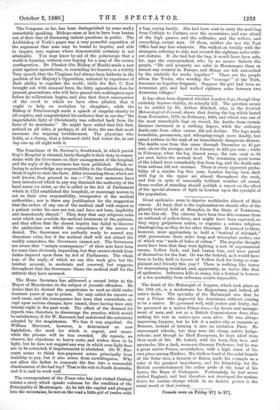The Congress, so far, has been distinguished by some really
remarkable speaking. Bishops seem at last to have been beaten out of their fear of discussing radical questions in public. The Archbishop of York's paper was a very powerful exposition of the argument that man may be bound to inquire, and able to inquire, into regions where demonstrable certainty is not attainable. You may know by aid of the polariscope that a world is burning, without ever hoping for a map of the cosmic conflagration. Dr. Plunket (the Bishop of Meath) made a new point against agnosticism, in reminding his hearers, in a wittily Tory speech, that the Utopians had always been hitherto in the position of her Majesty's Opposition, untested by experience of their ability to regulate the world; while the Rev. C. Row brought oat, with unusual force, the little agnosticism does for present generations, who will have passed into nothingness ages before its millennium begins, and also that direct consequence of the creed to which we have often alluded, that it ought to help on evolution by slaughter; while the Bishop of Peterborough made a speech of singular charity to all sceptics, and congratulated his audience that in our day " the imperishable light of Christianity was reflected back from the faces of its assailants." He might have added that this fact, noticed on all sides, is perhaps, of all facts, the one that most increases the reigning bewilderment. The physician who holds, as a theory, that a deformed child had better die, in our day sits up all night with it.


































 Previous page
Previous page